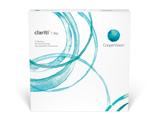
Nausea, congestion, snoring, skin tags; it seems like no part of the body is unaffected by pregnancy. The eyes are no exception. Changes in hormones, metabolism, fluid retention, and blood circulation all have an impact on your eyesight during pregnancy. Most symptoms are minor and will subside after the baby is born or weaned, but some signal the possibility of a more serious problem requiring immediate medical attention.
Pregnancy related eye conditions:
You can probably tell by how your rings feel if you’re retaining any water. This can cause the thickness and curvature of the cornea to increase slightly causing a small shift in your prescription. Most eye doctors don’t recommend getting a new prescription for contacts or glasses during this time because in most cases, the change will reverse itself within a few months of delivery.
Another common complaint during pregnancy is the dryness and irritation in the eyes due to the shifting hormones. If the dryness is preventing you from wearing your current contacts, ask your eye doctor about what options are best for you.
Pregnancy can also affect existing eye conditions. If you have diabetes, go to an ophthalmologist before getting pregnant and then early in your pregnancy to get screened for diabetic retinopathy, which often worsens during pregnancy. Also, ask your eye doctor if any exposure to the medication is okay for the baby.
When to be concerned:
There are some symptoms that could be the sign of a more serious disorder. High blood pressure or preeclampsia both can cause vision disturbances, for example. Call your midwife or OB if you have any of the following symptoms:
- Excessive swelling or puffiness
- Double vision
- Blurry vision
- Light sensitivity
- Loss of vision
- Seeing floaters and flashing lights
How to have healthier eyes during pregnancy:
You can help relieve some of your pregnancy related eye symptoms through diet. Eating foods high in omega-3 fatty acids (DHA and EFA), such as salmon, walnuts and flax seeds may help relieve your dry eye symptoms and have the bonus of helping your baby’s developing brain.





